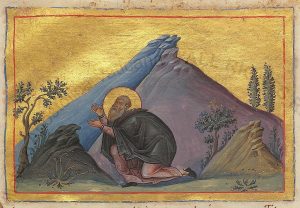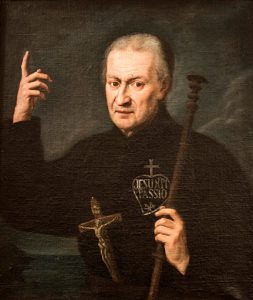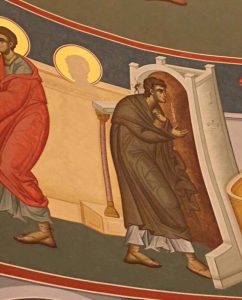Last week Dom Boniface’s Part I in Benedictine Spirituality I: Silence and then Part II of the Benedictine Spirituality II: The Master’s Instructions. Here is Part III: The Ear of the Heart.
I also highly recommend not only to the Oblates but also those who follow Communion and Liberation to attend all the essays as there are points of convergence in our work in the School of Community.
The Ear of the Heart – “attend to them with the ear of your heart”
Saint Benedict teaches the monk in the first verse that there is a deeper way of listening. We take in reality through our five external senses (sight, hearing, etc.) but we also learn to detect something deeper. Reality is not merely a scientfic fact. All of reality conveys meaning as well. When we look at a car we do not normally see a metal object made of thousands of parts. Rather we see transportation that moves us from point A to point B. When we look at a subway car or a subway line, it appears to us as a portal that picks us up at one place and drops us at another. When we see physical objects, their meaning presents themselves to us first. This is so strong, in fact, that we simply do not see things that are not meaningful to us. When we are driving on the highway, we block out most of the things around us and focus on a few things in front of us. When we are walking through city streets we simply never notice things that do not affect us or have any impact on our purpose. The direction of our intention (the focus of our inner eye or the attention of our inner ear) determines what we perceive. This is why it is so important to focus our attention appropriately, and Saint Benedict instructs us to focus the attention of the ear of heart on the Master’s instructions.
God speaks through everything. The Word is constantly expressing Itself through creation and through history. The Word can be heard in human events and through human voices. Every event carries a deeper meaning if we can tune our ears to hear it.
A Benedictine motto was developed in the 18th century to summarize the Benedictine life: ora et labora (pray and work). By focusing on prayer first, but then by balancing prayer and work, the monk learns to listen to God even during his work. Saint Benedict noted that the monk is to “regard all utensils and goods of the monastery as sacred vessels of the altar and nothing is to be neglected” (RB 31:10-11). This shows the potential that Saint Benedict sees for finding God in work. Work can be carried out with attention and reverence. The monk can listen to God with the ears of the heart as he carries out simple, mundane tasks or as he takes on complex challenges. Throughout history, monks have carried out simple tasks such as cleaning and cooking and copying books, more complex tasks like gardening and farming, and creative work like art and music. In those activities, monks have been innovators. The first geneticist was a monk. Monks developed technologies to assist in their work. The noteworthy thing, however, is that in the midst of all of it, Benedictines have tried to listen to God with the ear of the heart.
The ear of the heart could be described as a contemplative sensitivity. In the Catechism, contemplation, or “inner prayer” is defined as a prayer that can take place at all times and persists in the heart: “One cannot always meditate, but one can always enter into inner prayer, independently of the conditions of health, work, or emotional state. The heart is the place of this quest and encounter, in poverty and in faith” (CCC 2710). “Contemplative prayer is hearing the Word of God” (CCC 2716) by which we “enter into the presence of him who awaits us” (CCC 2711). St. Thomas Aquinas described contemplative prayer as a loving awareness of God’s presence. These descriptions all point to a knowledge that is not rational, but intuitive. We describe it as “heart-knowledge” or a hearing with the ear of the heart.
Saint Benedict encourages his monks to remain in this kind of contemplative prayer by always being attentive with the ear of the heart. Even while the mind is dedicated to a particular task, the heart can continue listening and thus remain connected to the Word of God. Just as we can be aware of the presence of a beloved friend in the room with us even while we are intensely focused on a particular activity, so also the monk seeks to be aware of the presence of God while he carries out his daily work. Saint Benedict instructs the monk always to remember that he is beneath the loving gaze of God (RB 7:13-14). He also calls the monk to continually pray in the heart, especially seeking mercy in his sinfulness (RB 7:65). To keep this contemplative prayer alive, only short acts of recollection are needed. This is why Saint Benedict tells the monk his prayer need not be prolonged, but rather “short and pure” (RB 20:4). A little burst of attention, a short prayer such as “My Jesus, my mercy” or “Jesus, I trust in you” can be enough to keep the flame of loving attention alive in the heart. The Catechism reaffirms that “Contemplative prayer is silence, the ‘symbol of the world to come’ or ‘silent love.’ Words in this kind of prayer are not speeches; they are like kindling that feeds the fire of love” (CCC 2717). Saint Benedict directs his monks to spend many hours every day praying with Scripture and the monk can carry a few words from that time of prayer to use as “kindling” to keep the flame of contemplation alive in the heart.
We have seen now that Benedictine spirituality can be summarized in the first verse of the Rule of Saint Benedict: “Listen, my son, to the Master’s instructions and attend to them with the ear of your heart.” By including more silence in our lives and opening our hearts in humble obedience, we can learn to listen better. Likewise, by prioritizing our prayer and the time we spend in the place of prayer, we can learn to listen to God who is the Master and then also learn to hear Him throughout the events of the day. Lastly, by learning to be attentive with the ear of the heart, we can carry out our daily duty with unceasing, contemplative prayer. Such prayerful work lies at the heart of Benedictine spirituality.
 Among many saints and blesseds liturgically honored today (e.g., Saint Wolfgang & Blessed Theodore Romzha), we have the feast of the Jesuit Saint Alphonse Rodriguez, known for his extraordinary holiness that shone out of his ordinary work as the doorkeeper of a Jesuit school. Tremendous opportunities for holiness in the ordinary.
Among many saints and blesseds liturgically honored today (e.g., Saint Wolfgang & Blessed Theodore Romzha), we have the feast of the Jesuit Saint Alphonse Rodriguez, known for his extraordinary holiness that shone out of his ordinary work as the doorkeeper of a Jesuit school. Tremendous opportunities for holiness in the ordinary.





